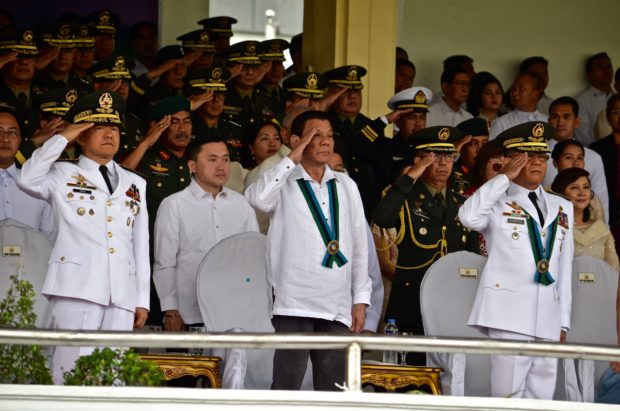
Incoming DILG Sec. Lt. Gen. Eduardo Año, President Rodrigo Duterte and AFP Chief of Staff Lt. Gen. Rey Leonardo Guerrero during the AFP Change of Command at Camp Aguinaldo in Quezon City. Noy Morcoso/INQUIRER.net
President Duterte has ordered the new military commander to recruit and organize 10 new infantry battalions to crush remnants of pro-Islamic State (IS) militants, days after they were defeated in Marawi City.
The military on Monday declared victory over the pro-IS fighters, which seized control in the city on May 23, after killing the last 40 remaining militants, including a few foreign fighters.
More than 1,100 people, including 165 soldiers and policemen, died in the five-month conflict.
“We were instructed to organize 10 additional battalions,” new military chief Lt. Gen. Rey Leonardo Guerrero told reporters on Thursday after Mr. Duterte installed him to head the 130,000-strong Armed Forces of the Philippines. One battalion comprises about 500 soldiers.
‘Defeat the NPA’
“We really intend to put pressure and sustain effort to be able to finish all of them and complete the resolution of armed conflict in the country,” Guerrero said.
Guerrero, who was promoted from commander in Mr. Duterte’s home region, said the military had also been ordered by the President to try to defeat the 4,000-strong communist New People’s Army (NPA).
The government is engaged in peace talks with Muslim separatists trying to carve out an autonomous region in the south, enlisting the main Moro Islamic Liberation Front to help fight a small group of rebels who have pledged allegiance to IS.
“We already have timetables and targets and I intend to meet that,” said Guerrero, who only has two months to serve before he retires. “The military has a multiyear program, it’s not dependent on personalities, but its tasks are lined up regardless of who assumes the leadership.”
The military has been steadily pulling its forces out of Marawi since the end of fighting and the remaining troops are conducting mopping-up operations to ensure no more “stragglers” remain even in bombed-out buildings.
Col. Romeo Brawner Jr., deputy commander of Joint Task Group Ranao, told the Inquirer by phone on Friday there were “no more stragglers” and that troops continued inspecting “every nook and cranny of the main battle areas (MBAs), including tunnels.”
A day earlier he said soldiers recovered more weapons used by the terrorists, including a locally made recoilless grenade launcher with ammunition, a .50-caliber Barett sniper rifle, four automatic rifles and assorted ammunition.
They also found communications equipment, laptop computers, drones and other items.
Danger from IEDs
Brawner said unexploded ordnance and improvised explosive devices (IEDs) left behind by the terrorists posed the greatest danger to soldiers conducting clearing operations. Those found have been detonated, he said.
He said soldiers had also been tasked to recover human remains from the war zone.
Heavy equipment such as bulldozers and backhoes were also being used by the troops to clear the roads of debris in order to increase their mobility “in searching for other forms of danger that lurk inside the MBAs,” Brawner said.
He also warned displaced residents against forcing their way into their homes in the former battle zones after one of two armed men who engaged troops conducting mopping operations in a brief firefight was killed.
“We believe they were residents who tried to sneak in around 3 a.m., possibly to check on their properties,” he said.
Brawner pointed out that residents in previously cleared areas—such as in Basak Malutlut—had been allowed to temporarily visit their properties.
Residents outside the former MBAs have been permitted to resettle.
“But for the MBAs, we still have to make sure that returning civilians are safe from IEDs, booby traps and other dangers,” Brawner added.
He said residents allowed to visit their properties needed certifications from village officials “to make sure they are really from that place.” The certifications would allow them to pass through checkpoints.
Others coming into the city would be required to get checkpoint passes, which could take time to obtain because of the long queues. —WITH REPORTS FROM REUTERS, RICHEL UMEL, ALLAN NAWAL AND DIVINA SUSON